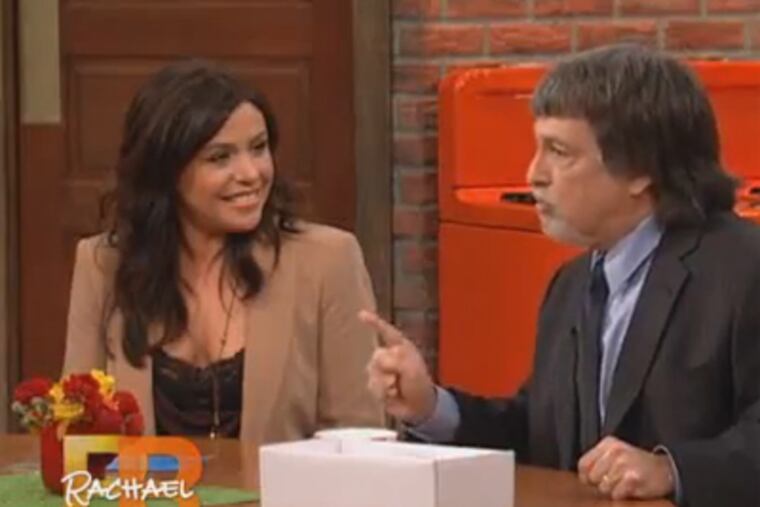Multi-jackpot winner shares lottery tips
It's possible to better your odds of winning a lottery jackpot, says Richard Lustig, who's won several himself.

It's possible to better your odds of winning a lottery jackpot, says Richard Lustig, who's won several himself.
Saturday evening, he'll be sharing advice at Pitman's Broadway Theatre, and selling copies of his book, Learn How to Increase Your Chances of Winning the Lottery.
With a $15 charge for admission, and another $40 for the book, the question is: Aside from entertainment value, would plunking $55 on Powerball be money better, er, invested?
First of all, he's not promising the moon. The idea is "hogwash" that anybody has a foolproof method, he said by phone. "Nobody can guarantee you're going to win a grand prize."
Second, his strategy stresses betting only what a player can comfortably afford.
"Do not spend grocery money. Do not spend rent money," he said. After all, for every big winner, there can be millions of losers.
While impressive, though, his winnings can't be called historic. According to the Florida Lottery, his biggest prize was a 2002 jackpot worth $842,000. This year alone, just in Pennsylvania, 80 players won at least $1 million.
Lustig also won roughly $74,000 in 2008 and $99,000 in 2010, with nine other payoffs worth $1,000 to $5,150 since 2000. His wife also won prizes worth $10,000 and $14,000.
Multiple winners are not unheard-of. On Nov. 1, a 91-year-old great-grandmother from Indianapolis won $99,999, three months after winning $300,000. In February, a CNN producer won $1 million playing a Georgia instant game, three months after winning $100,000 in another scratchoff.
Most impressive of all seems to be Joan Ginther, who won four Texas jackpots, including $5.4 million in a 1993 drawing, $2 million in a 2006, $3 million in 2008, and $10 million in 2010, the last three in scratchoff games.
Although she may have had a system - she has a Ph.D. in mathematics from Stanford - so far she hasn't shared her scheme through a book or lectures.
Some of Lustig's advice, mostly focused on numbers games, is hardly secret, since he's been interviewed everywhere from assorted radio stations to national TV, including Rachael Ray and Good Morning, America.
Many players know two key parts of his strategy: Play more, and play games that are easier to win.
"I'm trying to teach people how to play smart instead of greedy." Lustig said. ". . . Forget about Powerball, forget about Mega Millions, because the odds are so astronomical" - about 1 in 175 million.
The chance of winning New Jersey's Cash 5, by comparison, is about 1 in 658,000 - still terrible but hundreds of times more possible.
So far, so logical, a University of Pennsylvania math professor agrees. But Dennis DeTurck, dean of the College of Arts and Sciences, sees little else a player can realistically do.
"Certainly, the only ways to improve the odds are to make the game easier or to buy more chances," he said.
Here's one more: Check those slips! On Monday, time will be up for a Powerball ticket worth $200,000 purchased last Dec. 24 at Milleries Food Market in Mount Holly.
Lustig does go further, with only a little elaboration.
"Anyone who buys more tickets than the next guy is going to have a better chance of winning, but that's not what the method is all about," he said.
"Do not play quick picks, and I will explain to them why," he said.
"If you want to be a serious player, you have to be a regular player," he said. ". . . You gotta treat the lottery like a job."
Apparently, his method is largely a parlay system: Win small prizes to afford more and more tickets.
"Play the smaller games and then you can win, build a nest egg and then go after the bigger games," he said.
He wouldn't disclose the most he ever spent on one lottery, but did outline one approach "if you are fortunate enough to be a winner": He'd take a third and "blow it" on luxuries, like the BMW he bought for his son, save a third, and "take another third to buy lottery tickets! Now you're playing with lottery money and not your money," he said.
As for scratchoff games, his advice on Rachael Ray was to set a budget, divide by 10, and "Buy 10 tickets in a row of the same game. ... If you do that, 99.9 percent of the time, folks, you're going to find at least one, most of time two, and sometimes even three winning tickets in that stretch of 10 in a row."
Ray bought 125 tickets for her audience to scratch off, and Lustig was one of 17 who won money - but only one person won more than $20.
Lustig's method may sound manageable financially, but the idea of escalating involvement raises red flags for Donald Weinbaum, executive director of the Council on Compulsive Gambling in New Jersey.
Money isn't the only cost, he said. Devoting time and energy to gambling can disrupt lives, straining relationships, interfering with productivity, and encouraging lies.
"If your life is starting to be about gambling, to the exclusion of other activities, that might be a sign of trouble," Weinbaum said.
Excitement hooks addictive personalities.
"They like to stay in action, and they like to play, whether they're winning or losing," he said.
An estimated 350,000 people in New Jersey have a gambling problem, Weinbaum said. Nationally, the rate is about 2 to 5 percent.
Those with gambling problems can find help through a variety of hotlines, including 1-800-426-2537 (1-800-GAMBLER) and the Pennsylvania Compulsive Gambling Hotline, 1-800-848-1880.
For more information about Lustig's 7 p.m. lecture, go to www.thebroadwaytheatre.org. His website is www.winninglotterymethod.com.